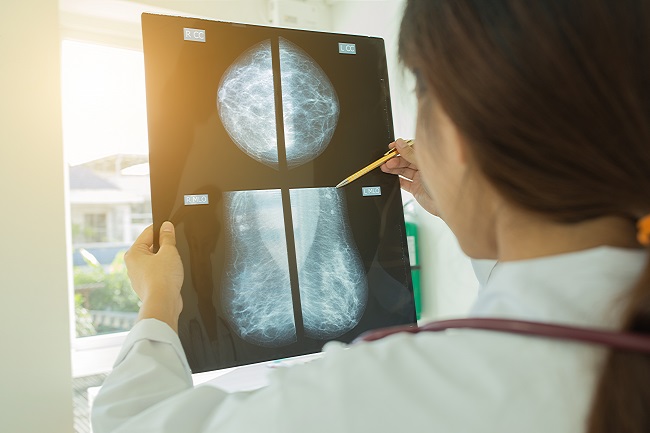UofG scientists receive funding to pave way to stopping aggressive breast cancer spreading
Published: 5 June 2025
University of Glasgow researchers are hoping to develop a more targeted treatment for people with triple negative breast cancer.
University of Glasgow researchers are hoping to develop a more targeted treatment for people with triple negative breast cancer.
Professor Seth Coffelt at the University of Glasgow has been awarded £399,670 from Breast Cancer Now and Secondary1st to fund research that will help further understanding of a type of immune cell that can kill triple negative breast cancer cells and stop them spreading.

Around 15%* of breast cancers are classed as triple negative and if this form of the disease becomes resistant to chemotherapy, there are few other treatments available. Triple negative breast cancer is also more likely than most other breast cancers to return or spread within five years following diagnosis.
When breast cancer cells from the first cancer in the breast spread to other parts of the body it’s called secondary or metastatic breast cancer and although treatable, it currently can’t be cured.
In his previous research funded by Breast Cancer Now and Secondary1st, Professor Coffelt identified a type of immune cell, called CD27 Ly6C gamma delta T (gdT) cell, which has the potential to become the target of a new immunotherapy treatment for triple negative breast cancer.
Immunotherapy works by reprogramming the immune system to recognise and destroy cancer cells. The team found that this gdT immune cell was able to kill triple negative cancer cells in the lab, slow the growth of the cancer and prevent secondary tumours developing in the lungs of mice.
In this new project, Professor Coffelt and his team will use cutting-edge microscope techniques to help them to understand how the gdT cells’ location allows them to find breast cancer cells coming into the lung. They will also build on their previous work to understand how gdT cells destroy triple negative breast cancer cells.
The team hope that by understanding which proteins control their killing ability, they can then use this knowledge to develop new or better immunotherapies. They’ll use antibodies to stimulate the proteins that can enhance the killing ability of the gdT cells and test if this approach works against breast cancer cells in the lab.
To understand how effective this treatment could be for patients, they’ll then test it on human gdT cells from samples donated by people with triple negative breast cancer.
Professor Seth Coffelt said: “My team previously found that a type of immune cell can kill triple negative breast cancer cells and prevent them spreading. Now, we will continue this research to investigate if immunotherapies can be developed to boost this immune cell’s ability to kill breast cancer cells. Some gdT cell immunotherapies are already in development, but we need to better understand how gdT cells work to ensure that they’re as safe and effective as possible. We hope this will pave the way for better targeted treatments for people with this type of breast cancer.
Dr Simon Vincent, Breast Cancer Now’s chief scientific officer said: “Each year around 8,000 UK women are diagnosed with triple negative breast cancer, which is usually a more aggressive form of breast cancer and more likely to return or spread soon after treatment.
“We know just how devastating a diagnosis of secondary (metastatic) breast cancer can be, which is why Breast Cancer Now is delighted to be funding this important research that could lead to new, effective ways to treat people with triple negative breast cancer and stop them dying from this devastating disease. And we thank Secondary1st for their generous support of this research.”
Enquiries: ali.howard@glasgow.ac.uk or elizabeth.mcmeekin@glasgow.ac.uk
First published: 5 June 2025
<< June

